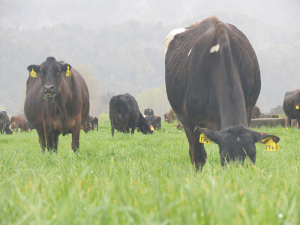Government Declares Medium-Scale Adverse Weather Event in Bay of Plenty, Gisborne/Tairāwhiti, and Canterbury
Recent weather events in the Bay of Plenty, Gisborne/Tairawhiti, and Canterbury have been declared a medium-scale adverse event.
 Higher-than-normal rainfall in Otago has brought some much needed breathing space for Otago farmers.
Higher-than-normal rainfall in Otago has brought some much needed breathing space for Otago farmers.
Higher-than-normal rainfall in Otago has brought some much needed breathing space for Otago farmers who may be facing another summer of dry conditions.
Otago Regional Council manager of resource science Dean Olsen says soil moisture is currently close to normal for the time of year, and not as dry as it was this time last year.
“We’ve seen some good levels of rain in October, which has helped replenish the moisture in the soils and aquifers and in some rivers, but with a La Nina event predicted, parts of the region remain at risk of drought-like conditions,” Dr Olsen says.
“Looking back over the past six months, we can see that conditions over much of Otago have been on the dry side, which is reflected in the condition of some of our river systems.”
Dr Olsen says river flows had been below normal for this time of the year in the Taieri, Manuherikia, and Lindis catchments. Low groundwater levels were observed in the North Otago Volcanic Aquifer, Waitaki Plains, and parts of the lower Taieri.
With NIWA predicting average to below average rainfall for the region, ORC is encouraging farmers to get together with other water users to prepare for the likelihood that they will need to share available water.
Council chief executive Peter Bodeker says he is confident water users would do their utmost to manage the region’s water responsibly.
“We saw throughout last spring and summer that water users operated both responsibly and collaboratively in how they responded to very dry conditions,” Bodeker says.
“We saw an extremely high level of compliance with consent conditions, and users responding swiftly to our requests to reduce taking water or stop altogether when required.
“Communities did an outstanding job of adhering to minimum flows, and sharing and rationing what water is available. I’m sure we will again witness this if the coming summer proves as challenging.”
Bodeker says it was also important for communities to understand the pressures that dry conditions brought, not just on the river systems, but on the farming community.
The Government has extended its declaration of an adverse event to cover most of the eastern seaboard of the South Island. In Otago this includes all of the areas within the Dunedin, Central Otago, and Waitaki districts.
The classification means that farming families who are struggling may be able to in some circumstances access support and financial assistance.
Bodeker says the first point of contact for any family needing help was the local rural support trust.
The Meat Industry Association of New Zealand (MIA) today announced that Chief Executive Officer Sirma Karapeeva has resigned from the role.
The winners of the 2026 Hawke’s Bay/Wairarapa Dairy Industry Awards were announced at the annual awards dinner held at Copthorne Solway Park in Masterton on Thursday evening.
Environment Southland is welcoming this week’s decision by the Environmental Protection Authority (EPA) to approve the release of Blaptea elguetai, a leaf‑feeding beetle that will help control the highly invasive Chilean flame creeper.
This March, the potato industry is proudly celebrating International Women’s Day on 8 March alongside the International Year of the Woman Farmer, recognising the vital role women play across every part of the sector — from paddocks and packhouses to research, leadership, and innovation.
Fruit trader Seeka posted a record profit and returns to shareholders in 2025.
Recent weather events in the Bay of Plenty, Gisborne/Tairawhiti, and Canterbury have been declared a medium-scale adverse event.

OPINION: A mate of yours truly reckons rural Manawatu families are the latest to suffer under what he calls the…
OPINION: If old Winston Peters thinks building trade relations with new nations, such as India, isn't a necessary investment in…